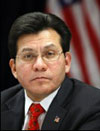|
|
|
New Hampshire legislature passes civil unions bill
Law Center |
2007/04/27 05:44
|
The New Hampshire Senate voted 14-10 Thursday in favor a bill allowing same-sex civil unions, sending the legislation on to Gov. John Lynch for signature. The bill, passed by the state House of Representatives earlier this month, would authorize same-sex couples to enter into civil unions with "the same rights, responsibilities, and obligations as married couples." Lynch said last week that he will sign the legislation. Currently, Massachusetts, Vermont, Connecticut, and New Jersey are the only states that recognize full civil unions. The Oregon House of Representatives approved a civil unions bill earlier this month, and Washington's State Senate passed a domestic partnership bill last month. New York Governor Eliot Spitzer said earlier this week that he would introduce legislation to legalize same-sex marriage in New York. |
|
|
|
|
|
|
Pentagon To End Talon Data-Gathering Program
Law Center |
2007/04/26 00:19
|
 An NBC News report in December 2005 revealed that the military maintained the database of "suspicious incidents," including peaceful anti-war protests and groups. Vietnam war era regulations limit what information the military can collect about people and activities taking place inside the US, and the Pentagon launched an investigation into possible misuse of the program. According to DOD officials, the investigation revealed that 261 entries were improper and subject to removal. Military officials have also acknowledged that some records were kept longer than the DOD's internal 90-day policy even though the groups had been deemed not to be a threat. US Sen. Patrick Leahy (D-VT) welcomed the decision Wednesday, saying that " Talon was another costly, controversial and poorly focused venture that did not make us any safer, while taking a hefty toll in Americans' privacy and Americans' tax dollars. Without clear rules and close oversight, databases like this can easily be abused to violate the public’s constitutional and privacy rights." |
|
|
|
|
|
|
Ex-congressional aide pleads guilty in scandal
Law Center |
2007/04/25 08:17
|
| A former congressional aide pleaded guilty on Tuesday to accepting tens of thousands of dollars in gifts from lobbyist Jack Abramoff in an influence-peddling scandal that has touched the White House, Interior Department and congressional Republicans. Mark Zachares, the 11th person to be convicted in the Justice Department inquiry, admitted engaging in official acts on Abramoff's behalf while working for Rep. Don Young, R-Alaska, who chaired the Transportation and Infrastructure Committee. Abramoff assisted Zachares in obtaining his committee post. Zachares left Young's staff in 2005. Young's office declined to comment Tuesday. "Guilty, your honor," Zachares told U.S. District Judge Ellen Segal Huvelle, who had asked what plea he would enter to a single count of conspiracy. He faces a maximum of five years in prison, but under federal sentencing guidelines will probably face two years or less. After the court appearance, defense attorney Edward MacMahon declined to say whether Young knew what Zachares was doing on behalf of Abramoff. Zachares agreed to cooperate with the government's continuing investigation and, outside the courthouse, MacMahon reinforced that point. The former Republican aide is the fifth congressional staffer to plead guilty in the Abramoff scandal, including two former aides to former House Majority Leader Tom DeLay, R-Texas. Zachares provided information to Abramoff about pending congressional actions on the reorganization of federal agencies into the Homeland Security Department. Zachares said in court that Abramoff and his lobbying team supplied him with $30,000 worth of tickets to sporting events and concerts on more than 40 occasions in the 18 months from mid-2002 to early 2004. Zachares accompanied Abramoff and six others, including Rep. Tom Feeney, R-Fla., on a $160,000 golf junket to Scotland in 2003, according to the conspiracy count to which Zachares pleaded guilty. Feeney's office said the Justice Department has contacted the congressman to request more information and that Feeney is cooperating. Early this year, Feeney agreed to reimburse the government $5,643 for the Scotland trip. According to a statement of facts that Zachares signed on March 14, he "falsely reported the cost of transportation, lodging and meals as only $5,643, a figure coordinated with Abramoff to be substantially identical as the figures other attendees, including Representative .3, would report."Representative .3" refers to Feeney. After Tuesday's guilty plea, Feeney's office said only that the congressman "is anxious to discuss this matter at the appropriate time." |
|
|
|
|
|
|
Bush continues to support embattled Attorney General
Law Center |
2007/04/24 09:01
|
| US President George W Bush continued to firmly back his embattled Attorney General Alberto Gonzales, who is facing bipartisan calls to quit his job over the controversial firing of eight US attorneys. Speaking at the White House yesterday, Bush maintained his top law enforcement officer "broke no law" and his appearance last week before the Senate judiciary committee had "increased my confidence in his ability to do the job." "As the investigation or the hearings went forward, it was clear that the attorney general broke no law, did no wrongdoing. And this is an honest, honorable man in whom I have confidence," the president said. Bush also maintained Wolfowitz was honest in answering every query that was posed at him in the panel hearing. "The Attorney General went up and gave a very candid assessment and answered every question he could possibly answer -- honestly answer. And in a way that increased my confidence in his ability to do the job." The President also stressed the Attorney General "has the right" to recommend the replacement of attorneys. "One of the things that's important for the American people to understand is that the Attorney General has a right to recommend to me to replace US attorneys. US Attorneys serve at the pleasure of the president. In other words, we have named them and I have the right to replace them with somebody else," Bush remarked. |
|
|
|
|
|
|
US law would have denied Virginia Tech killer a gun
Law Center |
2007/04/21 12:06
|
Virginia Tech shooting gunman Seung-Hui Cho was technically prohibited from purchasing firearms after a Virginia court found Cho to be an "imminent danger to himself" in December 2005 and issued an order for Cho to receive psychiatric treatment, the New York Times reported Friday. Under federal law, persons "who have been adjudicated as a mental defective or who has been committed to a mental institution" are prohibited from possessing or receiving "any firearm or ammunition." US federal firearm regulations define "adjudicated as a mental defective" to include a determination by a court that the person "is a danger to himself." Virgina is among 22 states currently submitting mental health records to the National Instant Criminal Background Check System, which requires Federal Firearms Licensees to request background checks on individuals attempting to receive a firearm. Despite being the leading state in reporting mental disqualifications, Virginia's state rules on "mental disqualifications to firearms purchase" differs from the federal regulations and only require submission of records of persons who have been "involuntarily committed" or ruled mentally "incapacitated." Legislation seeking to improve NICS enforcement has been introduced in the House of Representatives in the past three terms, but has never become law.
|
|
|
|
|
|
|
House passes DC congressional voting rights bill
Law Center |
2007/04/20 07:30
|
| The US House of Representatives passed the District of Columbia House Voting Rights Act (HR 1905) Thursday, which could increase official House membership for the first time since 1960. The bill, which passed 241-177, would make the District of Columbia a congressional district with full voting rights in the House, and as a compromise with Republicans, add a temporary at-large seat for Utah. Utah came close but fell short of obtaining a new district after the 2000 census. The future of the bill in the less Democratically-dominated Senate is far from certain, however, and President George W. Bush has threatened a veto, calling the bill unconstitutional. The District of Columbia currently has a delegate in the House, Eleanor Holmes Norton, who is able to vote in committee and on some amendments, but is not allowed to vote on the final passage of a bill. A February report by the Congressional Research Service flagged the potential unconstitutionality of any bill granting a House vote for the District, focusing on the language in Article I, Section 2, Clause 1 of the Constitution that the House is to be comprised by the "people of the several States." |
|
|
|
|
|
|
GOP stops Medicare drug price measure
Law Center |
2007/04/19 07:01
|
| The US Senate voted Wednesday against a motion to advance legislation that would permit the Department of Health and Human Services or another federal government entity to intervene in Medicare drug pricing negotiations between drug makers and private insurance plans on behalf of the nation's elderly and disabled beneficiaries. The Medicare Prescription Drug Price Negotiation Act passed the Senate Committee on Finance last week, but President Bush said Tuesday that he would veto the measure. The motion to invoke cloture failed by a margin of 55-42. Democratic proponents of the legislation argued that government involvement in drug pricing negotiations would result in lower health care costs for the elderly and taxpayers. Republicans countered that the Medicare program is already achieving lower-than-expected drug costs for seniors through the use of private insurance companies and government intervention would result in a disruptive "takeover" of the price negotiation process. |
|
|
|
|
|
|
Class action or a representative action is a form of lawsuit in which a large group of people collectively bring a claim to court and/or in which a class of defendants is being sued. This form of collective lawsuit originated in the United States and is still predominantly a U.S. phenomenon, at least the U.S. variant of it. In the United States federal courts, class actions are governed by Federal Rules of Civil Procedure Rule. Since 1938, many states have adopted rules similar to the FRCP. However, some states like California have civil procedure systems which deviate significantly from the federal rules; the California Codes provide for four separate types of class actions. As a result, there are two separate treatises devoted solely to the complex topic of California class actions. Some states, such as Virginia, do not provide for any class actions, while others, such as New York, limit the types of claims that may be brought as class actions. They can construct your law firm a brand new website and help you redesign your existing law firm site to secure your place in the internet. |
Law Firm Directory
|
|









